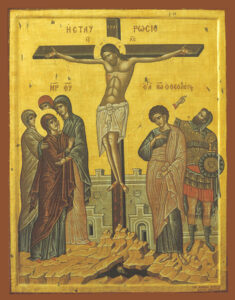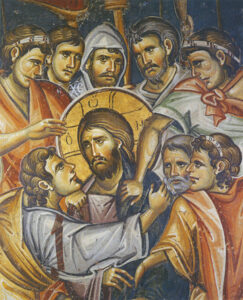We all know that in the Orthodox Church the Divine Liturgy is always a celebration, not allowed during the penitential weekdays of the Great Lenten Fast. We also know that Holy Week is our most penitential period. Furthermore, running with our peculiar Holy Week schedule (which I’ll not go into again here), this actually turns out to be a Holy Friday Liturgy – Holy Friday, our greatest and most solemn Fast Day.
Why in the world do we Orthodox have a Divine Liturgy for Holy Friday?
Herein, I think, lies the Orthodox understanding of the Death of Christ on the Cross. We see Christ’s Crucifixion as a victory.
We Orthodox do not believe that Christ, by His agony and suffering on the Cross, somehow “paid the price of our sins”. (We do not believe that is even a Scriptural doctrine, but rather a product of the legalistic late Western Middle Ages.) We do not see Christ’s Crucifixion as something to mourn and grieve over, though of course He suffered – terribly.
The Cross of Christ is a triumph: Christ’s victory over temptation, over the sin of Adam and Eve. From the Cross, He cried “It is finished”, which meant not “Thank God My suffering is finally over…”, but “I have done it! I have completed it! I have shown that it can be done. I have brought mankind to completion, to perfection, its fulfillment – a human life lived without sin, completely ‘on the mark’. Now with Me, in Me, all men and women can finally be restored and brought to perfection. And in three days, all will see what this leads to: Resurrection! It is finished! I’ve done it!”
Therefore, Orthodox crucifixes show Christ not in agony but at peace, sometimes with a quiet look of triumph on His face.

That was the meaning of the Crucifixion, and that (I think) is why we celebrate the full Divine Liturgy for Great and Holy Friday.
So now, even though it seems hardly possible (unless you’re Orthodox and used to it), our Holy Week worship services and readings get even longer. (We Orthodox don’t know how to do “short”. If you want that you’ll have to go elsewhere.)
Henceforth, unless we want the text of these Posts to go on forever, it won’t be remotely possible to discuss everything in the readings. If you don’t hear them in church, I hope you’ll read at least some of them for yourself.
You can find them online easily at: 1 https://www.goarch.org/chapel/ 2 https://www.antiochian.org/liturgicday
Or if that doesn’t work, take the texts given here and “google” (or whatever) them online; or you can actually read from your printed Bible.
Try to give a little time to this. Approach in a spirit of prayer. Absorb them. Nothing more important this has ever happened in the history of the world.
Epistle at Divine Liturgy: 1 Corinthians 11:21- 32
We hear Saint Paul’s account (probably the earliest written account) of the institution of the Holy Eucharist. Then he adds: “For as often as you eat this bread and drink the cup, you proclaim the Lord’s death until He comes.” His triumphant saving death!

He goes on to elaborate regarding the dangers in Holy Communion. He’s writing, you’ll note, to the Corinthians who were forever getting things wrong. In this case, they were approaching the Eucharist casually.
He warns that “Whoever, therefore, eats the Bread or drinks the Cup of the Lord in an unworthy manner will be guilty of profaning the Body and Blood of the Lord.” (If any doubt that the early Church believed the Eucharist is truly the Body and Blood of Christ, they should read this passage “literally”.}
It is very important that we not misunderstand what Saint Paul said here. Does he mean that we must be morally perfect before we dare to receive the Holy Eucharist? Of course not. He wasn’t. He called himself “the chief of sinners”. If that’s the requirement, then only Our Lord Jesus and His Mother could receive Holy Communion! The purpose of the Sacrament is not to reward us for being good people, but rather to feed us, strengthen us so we can become better people.
Here’s what Saint Paul means by unworthy reception: “…for any one who eats and drinks without discerning the Body eats and drinks judgment upon himself” – that is, if someone comes to Communion without perceiving that this is truly the Body, the Living Presence of Jesus Christ. As one of our pre-Communion prayers says, “Behold, I approach for Divine Communion. O Maker, burn me not as I partake, for You are fire consuming the unworthy. But cleanse me from every stain.”
How would you approach your Lord Jesus, if you stood before Him right now? What would you say? I can’t imagine it wouldn’t be “Hi there!” but rather “Oh, Lord, I have sinned. I am not worthy to stand here. Cleanse me. Make me the person I should be.” And would He then reject you? Of course not. Christ came to save sinners.
That’s how we should approach the Holy Eucharist, for there we truly are in the presence of Our Lord Jesus Christ.

However, as Saint Paul teaches elsewhere, the Church also is the Body of Christ. The people of God are the Body of Christ. Where did he get this idea? Because after he had been persecuting the Church, that is, the Christian people, what did Christ say to him in his vision on the road to Damascus? He said, “Saul, Saul, why are you persecuting Me?” Acts 9:4
Receiving the Eucharist is not a private “me and Jesus” affair. Before we receive the Eucharist we need to be in union with Christ’s Holy Church, in “good standing” with the Church. We need to perceive Christ’s presence in the Christian people with whom we worship and live. We must receive the Eucharist “discerning” all this. And if we don’t perceive that, we receive unworthily, and “eat and drink judgment on ourselves”.
Saint Paul adds, in a startling line: “That is why many of you are weak and ill, and some have died. But if we judged ourselves truly, we should not be judged. But when we are judged by the Lord, we are chastened so that we may not be condemned along with the world.” Paul seems to suggest that’s why the Corinthians were physically ill. No matter, to receive the Eucharist “without discerning the Body” certainly makes us spiritually ill.
Receiving the Holy Eucharist therefore requires preparation. This is not McDonalds’, after all. We should not feel free to just run in occasionally and catch a quick snack of Holy Communion. Proper preparation means we must: 1 Repent, asking for the Lord’s forgiveness, being at peace with those around us; 2 Forgive those with whom we are at odds; * 3 Intend to try to live a better life; 4 Prepare ourselves by prayer and fasting; 5 Attend the full Liturgy – or at least (as some say, but I think they’re wrong!) in time to hear the Holy Gospel.
- or be in process of forgiving them. If they’re not open to making peace, at least forgive them within ourselves. Remember that forgiving within our hearts is a process. Often we’ve got to keep doing it again and again till the hurt is gone. So long as you’re trying to forgive, come to Communion. It will strengthen you in your intent.
As long as this is how we approach the Holy Gifts, we will not be receiving “unworthily”. They will be the means by which, by the power of Christ, we will grow in love and holiness.
Holy Gospel Reading:
Matthew 26:1-20; John 13:3-17; Matthew 26:21-39; Luke 22:43-44; Matthew 26:40-75; 27:1-2
To sum up this long passage, the Gospel covers:
How Jesus washed the feet of His disciples, even Judas’ – the sign of His abject servanthood: “As I have done to you, you must also do to one another”. (In some churches tonight, the bishop or priest washes the feet of some of his parishioners.)
Christ’s last temptation in Gethsemane. I think this was in one way His chief crucifixion, the crucifixion of His will. “Father, take this cup from me. Yet not my will, but Thine be done.” After that, the rest of the story necessarily followed.
 Judas betrays Him to the authorities, with a kiss. This was and is the usual Middle Eastern kiss of brotherly greeting. But Judas, how could you? How could you do that to your Lord…?
Judas betrays Him to the authorities, with a kiss. This was and is the usual Middle Eastern kiss of brotherly greeting. But Judas, how could you? How could you do that to your Lord…?
Simon Peter denies Him.
His trial before the Sanhedrin. When He was asked “Are you the Messiah”, He answered “You have said it”. This was His way of saying “Yes”, just as in modern English usage: “You said it”. It was finally time to say it clearly. On those grounds they convicted Him and crucified Him on the Passover – exactly as He had planned it.
The Sanhedrin did not want His blood to be on their “innocent” hands. Also, only the Roman authorities had power to execute, so “When morning came, all the chief priests and the elders of the people took counsel against Jesus to put Him to death; and they bound Him and led Him away and delivered Him to Pilate the governor.”
So much horror, coming so quickly. Try to imagine what this was like for our dear Lord Jesus. The final darkness of Holy Week, “that which was written of Me” was upon Him. He had known all along that this would come, but now it was here. “When I was with you daily in the temple, you did not try to seize Me. But this is your hour, and the power of darkness.” Luke 22:53
Next Post will arrive tomorrow for Holy Thursday Night Matins of Holy Friday: the “Twelve Gospels” Service